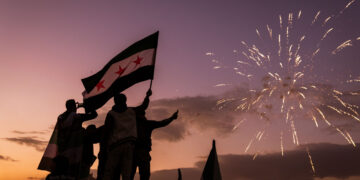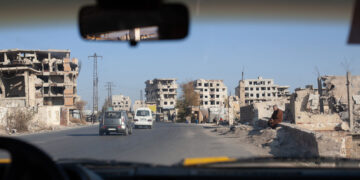Sarah Leah Whitson is the Executive Director of DAWN.
Most countries in the Middle East and North Africa are either quasi-failed states or autocratic regimes seething with undercurrents of instability. Saudi journalist-in-exile Jamal Khashoggi recognized this wrenching reality, and he understood the solution. Two years ago, shortly before his savage murder in the Saudi Consulate in Istanbul, he created an organization called DAWN to promote democracy, human rights and the rule of law for the Arab world. Today, DAWN relaunches to amplify a thousandfold his vision for the region.
I came to know Jamal when I was Human Rights Watch's Middle East director and he was a spokesman for the Saudi Embassy in Washington. In December 2016, after he had returned to Saudi Arabia and to his career as a journalist, Jamal told me that the then-deputy crown prince, Mohammed bin Salman, known as MBS, had banned him from public writing to punish him for tweeting critically about the incoming Trump administration.
[Read more pieces in this collection]
So I urged him to leave the country before the government banned him from travel and suffocated him even more. I had given this advice to many writers, activists and even government insiders from the region, who would one day wake up to find themselves targeted by their own governments. I knew of many Saudis who had discovered they were banned from travel at an airport passport line. A decade or more might pass before these bans would be lifted, as secretly and arbitrarily as they had been imposed.
When the travel bans in Saudi Arabia morphed into wide-scale arrests of scholars, writers and journalists later in 2017, Jamal saw the writing on the wall and fled. He came to the United States, where he became a columnist for The Post. From his new platform, Jamal championed freedom for the Arab world without regard to the wrath of Saudi rulers. Jamal thought he was safe outside his country. I thought he was safe, too. We were wrong.
While Khashoggi's murder has tarnished MBS's reputation, he has managed, so far, to elude significant consequences for his role in the murder. The United States and other Western governments have imposed sanctions on various Saudi officials implicated in the murder, but they have studiously avoided levying sanctions against MBS. Lucrative arms sales to Saudi Arabia have mostly continued without disruption. The upcoming virtual Group of 20 meeting in Riyadh will entail one more big collective push by global corporations and governments to help MBS sweep his bloodstained record under the rug so that business can return to usual.
Yet U.S. civil society organizations are upending the Saudi government's PR-fueled efforts at normalization, bringing lawsuits to compel the US government to disclose information about Jamal's murder, and organizing a boycott of MBS's planned G-20 pageant. In joining this struggle, DAWN will create a vibrant platform for political exiles from across the region to freely discuss, debate and promote their vision for freedom and democracy in the region.
Today, hundreds of thousands of people from the Arab world have been forced, like Jamal, to flee their countries for advocating reform, or even for participating in a single protest. We aim to bring their independent insights, analysis and recommendations, suppressed in their home countries, to the fore of global policymakers. As the people of Iraq, Lebanon, Sudan and Algeria recently have reminded us, the demands for just governance in the region have not gone away. They will continue to reemerge, from one country to the next, until fulfilled.
DAWN will also draw on in-country sources to develop detailed case files of political persecutions masquerading as judicial process, and expose the shadowy government agents — judges, prosecutors, prison wardens and interrogators — who operate the bureaucracy of repression, with nary a blemish to their reputations. Real justice and real accountability may well be elusive in all but the rarest of cases. But we will ensure that these otherwise comfortable culprits receive the notoriety they deserve. And we will certainly seek accountability right here in the United States for the murder of our founder.
Jamal had no illusions about the role of foreign governments, especially the U.S. government, in enabling the rule of the Arab world's autocrats. And he understood the United States' vital role in maintaining the Saudi monarchy's existence. As President Trump recently blurted out in a rare moment of candor, "They wouldn't last a week if we're not there, and they know it." DAWN will seek to influence the policy of the United States as well as other countries to stop harming the people of this region by supporting their abusive, illegitimate leaders.
Jamal believed most of all that democracy would be the only lasting answer for security, peace and dignity for the Middle East, and "the most effective way to tackle terror, stop bloodshed and political violence in Arab countries." We hope that DAWN's contribution to freedom and democratic governance in the Arab world will be his most lasting legacy.





































